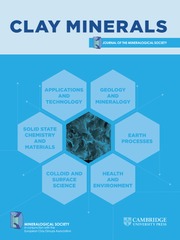Article contents
Clay-organic studies
XI. Complexes of benzene, pyridine, and piperidine 1,3-substituted propanes with a synthetic Ca-fluorhectorite
Published online by Cambridge University Press: 09 July 2018
Abstract
Complexes are formed between a Ca-saturated fluorhectorite and organic molecules derived from propane by substituting benzene, pyridine, and piperidine rings in the 1,3 positions. The complexes are mainly of the A- and B-types described earlier by Greene-Kelly. Only one of the substances studied forms long-spacing complexes; in this case, the organic molecule is terminated at one end by a benzene ring and at the other by an active =NH group. Neutral forms of this molecule develop double-layer complexes, cationic forms develop single-layer complexes. The results are consistent with data for alcohols, alkyl chlorides and bromides, and alkyl amines.
- Type
- Research Article
- Information
- Copyright
- Copyright © The Mineralogical Society of Great Britain and Ireland 1966
References
- 6
- Cited by


